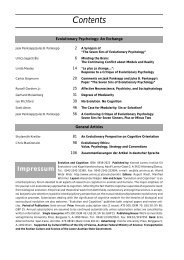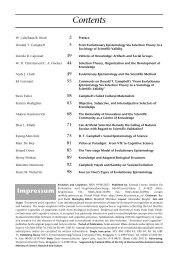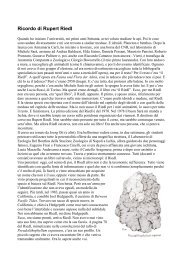Contents - Konrad Lorenz Institute
Contents - Konrad Lorenz Institute
Contents - Konrad Lorenz Institute
You also want an ePaper? Increase the reach of your titles
YUMPU automatically turns print PDFs into web optimized ePapers that Google loves.
Gestalt Experiments and Inductive Observations<br />
Mapping Gestalt Perception/Induction<br />
onto Observation/Experiment<br />
The first issue to be discussed is the question of in<br />
what manner the epistemological apparatus (ratiomorphic<br />
Gestalt perception and rational induction)<br />
relates to the ethological methodology (observation<br />
and experiment) as LORENZ viewed it. Some of<br />
LORENZ’s writings (especially the Russian Manuscript)<br />
suggest an epistemic asymmetry between Gestalt<br />
perception and induction and attribute different<br />
roles in scientific research to these mechanisms, so<br />
that a straightforward Gestalt perception–observation<br />
and induction–experiment correspondence<br />
seems plausible.<br />
The different epistemic roles of induction and<br />
Gestalt perception are due to the fact that the<br />
former is a rational process, but the latter is not. Induction<br />
is a tool for scientific analysis and for the<br />
confirmation of scientific claims. It is a cognitive<br />
process that aims at objective knowledge. The Gestalt,<br />
on the other hand, is a “purely subjective phenomenon”<br />
(1948, p140). 5 The result of this perceptive<br />
cognitive process is mediated as a whole to<br />
subjective experience. Without its parts being open<br />
to analysis, the Gestalt is seen and the received entity<br />
accepted (1948, p58). This epistemic difference<br />
is in particular shown by the fact that a result obtained<br />
by Gestalt perception is refuted by inductive<br />
evidence contradicting that result (1948, p68). The<br />
strength of induction is its accountability, while Gestalt<br />
perception is characterized by its incorrigibility<br />
and unaccountability (1948, p64). For this reason,<br />
Gestalt perception and induction play a different<br />
role in scientific research. Whereas induction is<br />
shortsighted and therefore not a good tool for scientific<br />
discovery (1948, p65), Gestalt perception is able<br />
to see unexpected regularities and unforeseen lawfulness<br />
(1948, p63; 1959, p282; 1981, p44). It is a<br />
good “hunch generator” (1963a, p7). As only Gestalt<br />
perception is really able to fulfill this function,<br />
its role in scientific research is to lead the way of discovery<br />
(1948, p56, 64; 1963a, p8). Gestalt perception<br />
is only a means of discovery. A detected principle<br />
has to be substantiated by induction, it is the job<br />
of rational processes to confirm scientific claims.<br />
“Therefore, only induction can increase the reliability<br />
of a result and only induction can validate a<br />
result that has been obtained exclusively through<br />
intuition!” (1948, p65)<br />
This yields the following account. The (subjective)<br />
discovery of scientific principles is achieved by Gestalt<br />
perception, while the (objective) confirmation and justification<br />
is obtained through induction. So far the identification<br />
of this epistemic relationship between Gestalt<br />
perception and induction in LORENZ’s work has<br />
mainly been based on the Russian Manuscript.<br />
Whereas these two different roles are very explicit in<br />
this piece of work, some passages of the later article<br />
Gestalt perception… give the same picture (1959,<br />
p316).<br />
On the one hand, LORENZ three stage model of science<br />
sounds like a sort of naïve Baconianism, according<br />
to which one first needs to collect in an unbiased<br />
and theory-independent manner as much<br />
data as possible and only then one can generalize<br />
laws and theories from it. On the other hand, the<br />
idea of Gestalt perception proposing hypothesis to<br />
be rationally tested might incline one to assume that<br />
LORENZ has a hypothetico–deductive account of science.<br />
Neither is really the case. LORENZ definitely is<br />
not a Popperian falsificationist. On his account, hypothesis<br />
cannot only be disconfirmed, but also confirmed<br />
by evidence. LORENZ accepts induction, in<br />
fact, he states that one can “use the breadth of the<br />
inductive basis to assess with genuine mathematical<br />
accuracy a probability value for the correctness of<br />
the result. Where that breadth is sufficient, the probability<br />
is so close to certainty that we can confidently<br />
equate the two.” (1948, p64) This makes him sound<br />
somewhat like a proponent of the modern Bayesian<br />
approach to theory confirmation by evidence. However,<br />
Bayesianism is just about confirmation and<br />
does not tell us how to come up with theories to be<br />
verified. The same applies for a naïve Baconian approach,<br />
which cannot make sure that anything theoretically<br />
useful emerges from unbiased and unfocussed<br />
data gathering. The discovery of theories was<br />
somewhat neglected by traditional philosophy of<br />
science, but LORENZ addresses this issue by pointing<br />
to Gestalt perception, which is supposed to deliver<br />
unexpected principles and hypotheses. This is<br />
maybe the most fruitful aspect of LORENZ’s epistemological<br />
perspective (besides the fact that he makes<br />
use of an evolutionary framework). LORENZ proposes<br />
processes that generate theories as well as confirm<br />
them. Rational and ratiomorphic processes are considered<br />
psychologically founded mechanisms,<br />
which in combination address the two most important<br />
aspects about scientific rationality—discovery<br />
and justification of theories.<br />
As discussed in the preceding section, experiment<br />
are methodologically and logically posterior to observation.<br />
Useful experiments can only be conducted<br />
after a good deal of observation has been undertaken.<br />
In fact, observation gives a meaningful<br />
Evolution and Cognition ❘ 163 ❘ 2003, Vol. 9, No. 2








